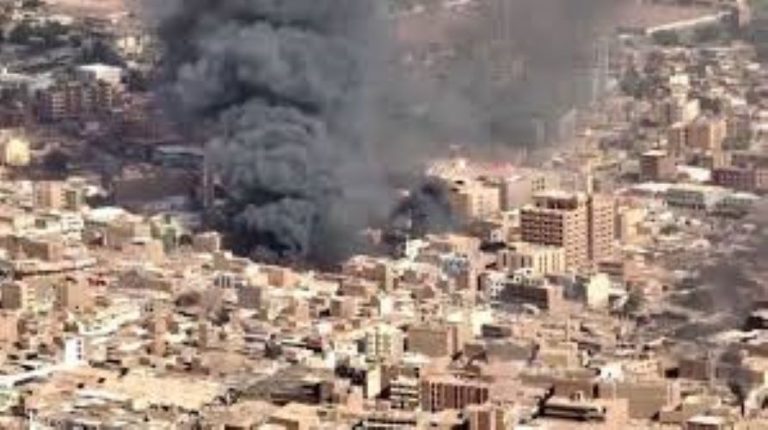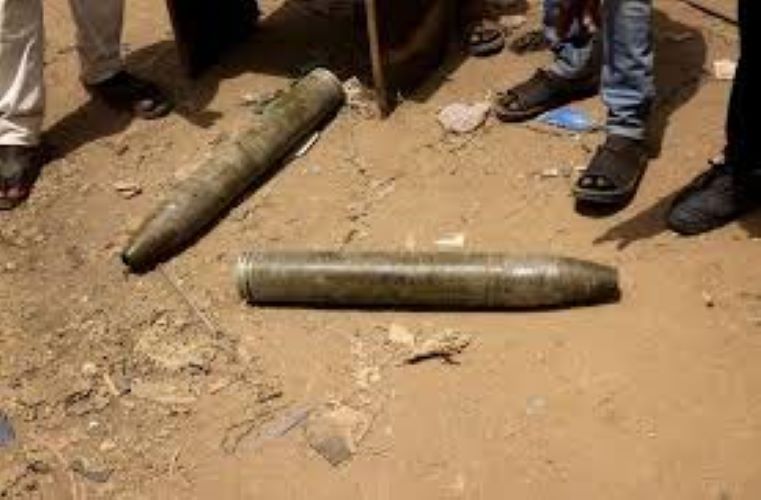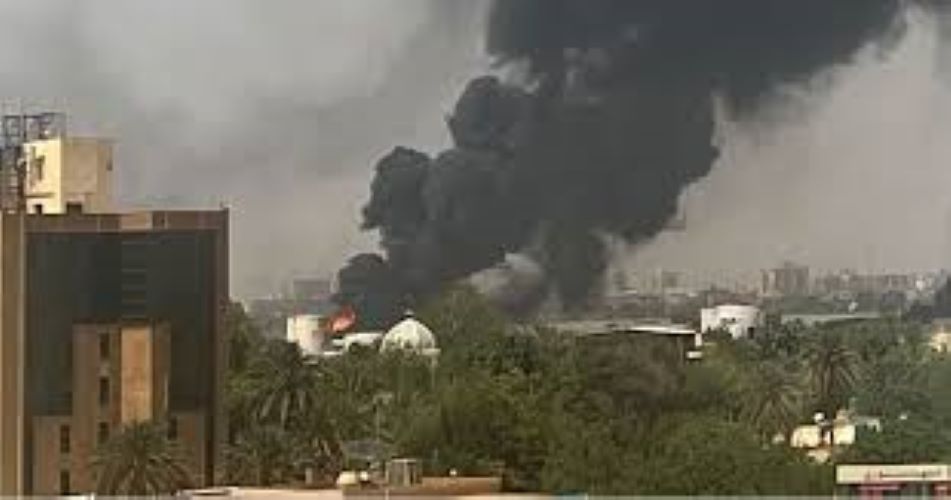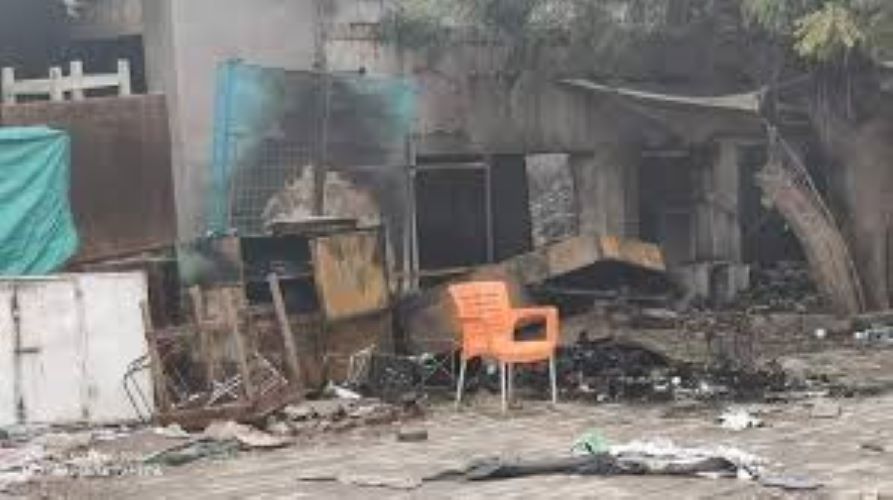
Ongoing heaviest fighting between the Sudanese army and the RSF has been concentrated in the densely-populated Khartoum State, which has become a war zone
By Yousif Ibrahim Abubaker Abdalla
Shells are seen on the ground near damaged buildings at the central market during clashes between the paramilitary Rapid Support Forces (RSF) and the army in Khartoum and Bahri, Omdurman. The RSF has accused the army of harming civilians through its use of warplanes and heavy artillery to bomb Khartoum State while the military has accused the RSF of killing civilians by firing missiles into residential areas, and then blaming the army for the attacks, and killing people as they loot homes and businesses.
The army and RSF shared power for four years after toppling former long-time autocratic ruler Omar al-Bashir in 2019. The two sides fell out over a plan to integrate their forces during a transition to democracy, sparking the current hostilities that began on April 15. Ongoing heaviest fighting between the Sudanese army and the RSF has been concentrated in the densely-populated Khartoum State, which has become a war zone. The RSF has fanned out in residential areas armed with rifles and artillery mounted on vehicles, with its soldiers embedding themselves in buildings, including homes and schools, locals say. The army – which controls the skies and possesses heavier artillery – has struck targets in Khartoum State from afar.
 More than 50 people died in just three attacks in densely populated southern Khartoum in late May and June, according to social media statements by the Southern Emergency Room, a volunteer group. In the city of Omdurman, across the Nile from the capital, at least four civilians were killed and four others injured in a drone attack earlier this month by the RSF, the national health ministry said on July 15. That assault targeted a military-run hospital, according to the ministry. An artillery strike in Omdurman nine days later killed 15 people and injured dozens of others, according to the emergency response group for the city’s Ombada district, neither the army nor the RSF responded to a request for comment on these incidents. The RSF has publicly accused the army of two of the attacks in southern Khartoum – on May 31 and June 17. The army said the RSF was responsible for the third Khartoum attack, on June 11, and the July 15 drone attack in Omdurman. Neither side publicly responded to the accusations nor have made public statements on the later July attack.
More than 50 people died in just three attacks in densely populated southern Khartoum in late May and June, according to social media statements by the Southern Emergency Room, a volunteer group. In the city of Omdurman, across the Nile from the capital, at least four civilians were killed and four others injured in a drone attack earlier this month by the RSF, the national health ministry said on July 15. That assault targeted a military-run hospital, according to the ministry. An artillery strike in Omdurman nine days later killed 15 people and injured dozens of others, according to the emergency response group for the city’s Ombada district, neither the army nor the RSF responded to a request for comment on these incidents. The RSF has publicly accused the army of two of the attacks in southern Khartoum – on May 31 and June 17. The army said the RSF was responsible for the third Khartoum attack, on June 11, and the July 15 drone attack in Omdurman. Neither side publicly responded to the accusations nor have made public statements on the later July attack.
Civilians are also dying as an indirect result of the conflict, which has hammered the country’s already stretched healthcare system and other infrastructure. Dozens of babies and young children died at an orphanage as the fighting kept staff away and caused power outages with air strikes and artillery shelling unrelenting, civilians are dying almost daily across the wider capital as a direct result of the conflict. RSF soldiers dot the main roads of Shambat, which sits close to a key RSF base called al-Mazalat and has long been a hotbed of protest against both the army and the RSF.
Clashes between the Sudanese Armed Forces (SAF) and the Rapid Support Forces (RSF) have entered its fourth month.
According to the Federal Ministry of Health (FMoH), the violence in Sudan has killed 1,105 people and injured 12,115 as of 11 July 2023, although the actual numbers are likely much higher. According to UNICEF, at least 435 children have been reported killed in the conflict and at least 2,025 children injured. UNICEF has received reports of a staggering 2,500 severe violations of children’s rights, representing an average of at least one an hour since 15 April.
 Over 3.5 million people have been displaced inside and outside the country due to the conflict that started in mid of April. Nearly 2.7 million have been displaced internally as of 25 July, according to the International Organization for Migration Displacement Tracking Matrix (IOM DTM). People have been displaced across all 18 states, the majority of whom are in River Nile, followed by Northern, White Nile, and Sennar states. About 73 per cent of the people displaced are originally from Khartoum. Among the newly displaced people, there are 187,000 refugees who have relocated from hotspot to safest areas in the country as of 16 July, according to Refugee Consultation Forum (RCF) partners. Of these, 66 per cent have been verified, of which 16 per cent are women, 34 per cent are girls, 36 per cent are boys and 14 per cent are men. Of the over 187,000 internal movements recorded, most of them, nearly 144,500, have arrived in White Nile. In addition, over 823,000 refugees, asylum seekers and returnees have crossed the border into neighboring countries, including Central African Republic, Chad, Egypt, Ethiopia and South Sudan, according to the UN Refugee Agency (UNHCR).
Over 3.5 million people have been displaced inside and outside the country due to the conflict that started in mid of April. Nearly 2.7 million have been displaced internally as of 25 July, according to the International Organization for Migration Displacement Tracking Matrix (IOM DTM). People have been displaced across all 18 states, the majority of whom are in River Nile, followed by Northern, White Nile, and Sennar states. About 73 per cent of the people displaced are originally from Khartoum. Among the newly displaced people, there are 187,000 refugees who have relocated from hotspot to safest areas in the country as of 16 July, according to Refugee Consultation Forum (RCF) partners. Of these, 66 per cent have been verified, of which 16 per cent are women, 34 per cent are girls, 36 per cent are boys and 14 per cent are men. Of the over 187,000 internal movements recorded, most of them, nearly 144,500, have arrived in White Nile. In addition, over 823,000 refugees, asylum seekers and returnees have crossed the border into neighboring countries, including Central African Republic, Chad, Egypt, Ethiopia and South Sudan, according to the UN Refugee Agency (UNHCR).
Attacks on health care continue to be reported across the country. Since 15 April, WHO has verified 53 attacks on health care resulting in 11 deaths and 38 injuries, according to the WHO Surveillance System of Attacks on Healthcare. These are only attacks WHO has been able to verify through its verification system. Attacks on health care include incidents involving hospitals, ambulances, laboratories, warehouses, health workers and patients.
More than 80 per cent of hospitals in the country are now out of service, according to a statement by WHO. And NGOs across Darfur have sounded the alarm that at least 60 operational NGO-supported health facilities are likely to run out of critical medical supplies in the next two weeks, further reducing the number of people receiving life-saving assistance, according to the NGO Forum. Across all affected areas, health staff have not been paid for nearly three months, and most of them have relocated to safer areas. There are serious shortages of specialized medical personnel, including anesthesiologists and surgical specialists, most of whom have relocated. Shortages of medicines and medical supplies, including treatment for chronic diseases, oxygen supplies and x-ray films, continue to be reported in some states, despite the provision of supplies by some health partners.
 Disease outbreaks—including malaria, measles, dengue and acute watery diarrhea—that had been under control before the conflict are increasing due to the disruption of basic public health services. As the rainy season begins, outbreaks are likely to claim more lives unless urgent action is taken to control their spread. A measles outbreak has been reported in 28 localities across 11 states. To date, over 900 cases have been reported from Gedaref, Aj Jazirah, Khartoum, Central Darfur, North Darfur, North Kordofan, West Kordofan, South Kordofan and River Nile States. State and area Rapid Response Teams (RRT) have been investigating the suspected cases, especially among displaced populations and are responding accordingly.
Disease outbreaks—including malaria, measles, dengue and acute watery diarrhea—that had been under control before the conflict are increasing due to the disruption of basic public health services. As the rainy season begins, outbreaks are likely to claim more lives unless urgent action is taken to control their spread. A measles outbreak has been reported in 28 localities across 11 states. To date, over 900 cases have been reported from Gedaref, Aj Jazirah, Khartoum, Central Darfur, North Darfur, North Kordofan, West Kordofan, South Kordofan and River Nile States. State and area Rapid Response Teams (RRT) have been investigating the suspected cases, especially among displaced populations and are responding accordingly.
Education has come to a standstill as war continues across the country. While children across the country and from all backgrounds have seen their education affected by the ongoing conflict, 936,000 displaced children have been forced to flee again as intensive conflict continues, reports the Education Cluster. Displaced children are now more vulnerable than ever before. The vast majority of them are now deprived of a safe, inclusive and quality education space and the multitude of short and long-term advantages it affords. Barriers such as a lack of access to education services, limited resources, ongoing insecurity, and social tensions will hinder access to education leaving them at high risk of dropping out of school. These challenges are further compounded by school premises across the county hosting displaced people and becoming emergency shelters. About 89 school premises are reportedly used by displaced people in North Darfur, White Nile, Gedaref, Kassala, South Darfur, West Darfur and Blue Nile states. If alternative shelter options for displaced communities are not found, these schools will not be functional when the new academic year begins in September or October. This could compound challenges in accessing education and could further expose children to child labor and abuse.
_____________________
 Yousif Ibrahim Abubaker is a TEFL Teacher, Poet, Journalist, Activist, and Freelance Interpreter/ Translator from Umbda Omdurman – Sudan. He also has been working as a debate leader discussing various topics in many English Institutes, Centers, Academies and Schools. He can be reached at: americanslang64@gmail.com
Yousif Ibrahim Abubaker is a TEFL Teacher, Poet, Journalist, Activist, and Freelance Interpreter/ Translator from Umbda Omdurman – Sudan. He also has been working as a debate leader discussing various topics in many English Institutes, Centers, Academies and Schools. He can be reached at: americanslang64@gmail.com
[…] burden of travel and the different checkpoints by both security forces and Rapid Support Forces. The fighting has turned urban areas into battlefields. We raise our hands to God almighty and ask him to solve the problem of Sudan. Fighting since […]